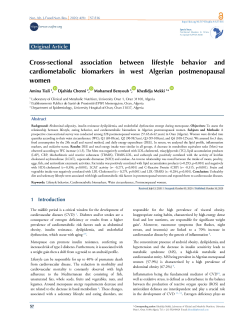Main Article Content
Cross‐sectional association between lifestyle behavior and cardiometabolic biomarkers in west Algerian postmenopausal women
Abstract
Background: Abdominal adiposity, insulin resistance dyslipidemia, and endothelial dysfunction emerge during menopause. Objectives: To assess the relationship between lifestyle, eating behavior, and cardiometabolic biomarkers in Algerian postmenopausal women. Subjects and Methods: A prospective cross-sectional survey was conducted among 228 postmenopausal women (57.65±6.42 years) in Oran (Algeria). Women were divided into quartiles according to their waist circumference (WC); Q1 (69-89cm), Q2 (90-98.5cm), Q3 (99-108cm), and Q4 (108-125cm). We assessed for 3 days, food consumption by the 24h recall and record method, and daily energy expenditure (DEE). In serum, we analyzed the lipid profile, inflammation markers, and oxidative status. Results: DEE and total energy intake were similar in all groups. A decrease in metabolism equivalent tasks (Mets) was observed according to WC increase (<1.5). The Mets was negatively correlated with LDL-cholesterol, triacylglycerols (TG), lipid accumulation products (LAP), CRP, thiobarbituric acid reactive substances (TBARS), TBARS-LDL, and carbonyls and positively correlated with the activity of lecithin cholesterol acyltransferase (LCAT), superoxide dismutase (SOD) and catalase. An inverse relationship was noted between the intake of meats, poultry, eggs, fish, and antioxidant enzymatic activities. Fat intake was positively correlated with lipid accumulation products (r=0.293, p<0.001) and negatively with HDL-cholesterol (r=-0.396, p<0.001), LCAT activity (r= -0.275, p<0.001) and C-Reactive Protein (CRP) (r= -0.315, p<0.001). Fruits and vegetables intake was negatively correlated with LDL-Cholesterol (r=- 0.279, p<0.001) and LDL-TBARS (r= -0.284, p<0.001). Conclusion: Unhealthy diet and sedentary lifestyle were associated with high cardiometabolic risk factors in postmenopausal women and exposed them to cardiovascular diseases.







